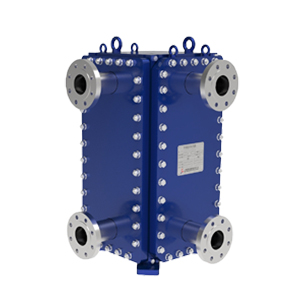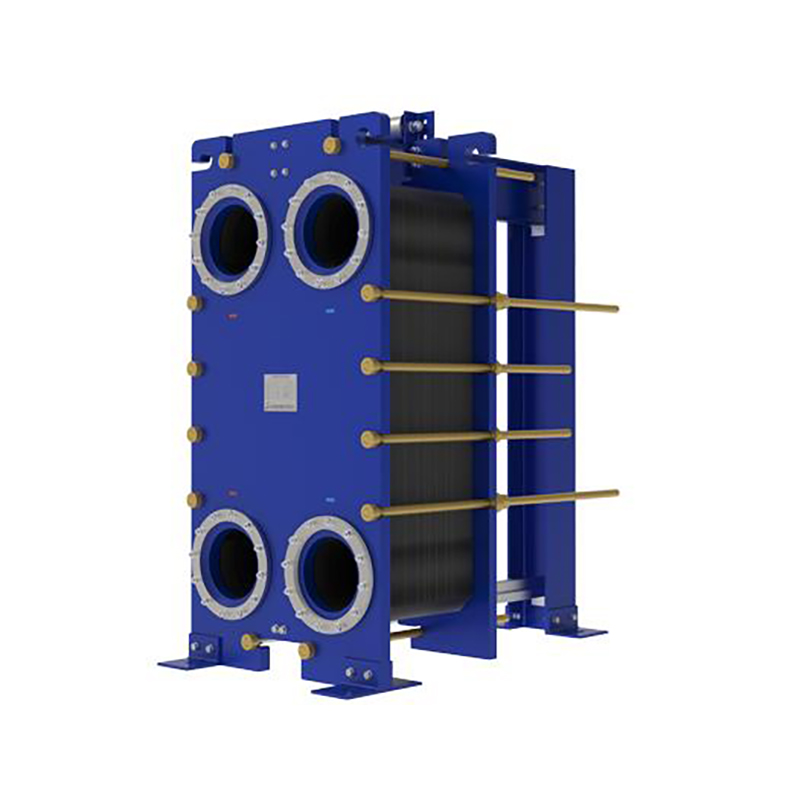Comparing welded block and gasketed plate heat exchangers
You can see clear differences between welded block...
More
Plate coils, also known as panel coils or embossed plate coils, are highly efficient heat transfer devices constructed from two metal sheets, typically stainless steel, carbon steel, or other alloys, which are welded together to form a continuous, serpentine flow channel. These channels are embossed or stamped into the plates before welding, creating a robust and leak-proof passage for heating or cooling media like steam, thermal oil, water, or refrigerant. Unlike traditional shell and tube heat exchangers, plate coils offer a compact, flat-panel design that provides a large surface area relative to their physical size, enabling superior thermal efficiency and rapid response times. They are engineered for versatility and durability, capable of withstanding high pressures and temperatures, and are utilized across a vast spectrum of industries for applications including tank heating, pasteurization, drying processes, and as radiant panels. Their primary advantage lies in their ability to deliver precise temperature control and maximize heat transfer efficiency in a space-saving configuration, making them an indispensable component in modern industrial thermal systems.
The fundamental design of plate coils is centered on maximizing the heat transfer surface area within a minimal footprint. The embossed pattern on the metal plates is not random; it is meticulously engineered to create turbulence in the fluid flowing through the channels. This turbulence is critical as it disrupts the laminar sub-layer, a stagnant film of fluid that acts as an insulator, thereby significantly enhancing the heat transfer coefficient. For instance, data from manufacturers like Heat Transfer Products Inc. indicates that plate coils can achieve heat transfer coefficients several times higher than those of conventional shell and tube exchangers for similar applications. The materials of construction are selected based on the specific process requirements, including corrosion resistance and pressure-temperature ratings. A common configuration involves using 304 or 316 stainless steel for corrosive environments, with plate thicknesses often ranging from 16 to 14 gauge to ensure structural integrity under pressures that can exceed 300 PSI in standard designs and even higher in custom-built units. The welding process, often performed using seam or laser welding techniques, is paramount to ensuring a completely hermetic seal, preventing any cross-contamination between the process fluid and the heating/cooling medium. This robust construction allows them to operate effectively in demanding services, from heating viscous fluids like molasses or asphalt in storage tanks to cooling industrial process water.
The operation of plate coils is governed by the fundamental principles of thermodynamics and heat exchange, specifically conduction and convection. The process begins when a thermal fluid (the service fluid), such as steam or hot water, is forced through the internal embossed channels of the coil. As this fluid travels through the serpentine path, its thermal energy is transferred through the metal plate wall via conduction. The metal, being an excellent conductor, quickly absorbs this energy. Simultaneously, the product or environment being heated or cooled (the process fluid or air) is in contact with the external surface of the plate. The heat energy then moves from the metal plate into this process side via convection. In a heating application, for instance heating a tank of liquid, the coil is submerged. The hot service fluid inside the coil warms the plate, which in turn warms the surrounding liquid, causing it to circulate naturally (or through agitation) and achieve a uniform temperature. The efficiency of this transfer is vastly superior to simple pipe coils due to the extensive surface area provided by the flat, wide plates. For cooling, the reverse occurs; a chilled medium like glycol or cold water inside the coil absorbs heat from the warmer process fluid on the outside, thereby lowering its temperature. The embossed pattern inside the coil is crucial as it induces turbulence, scrubbing the inner wall and minimizing scale buildup while ensuring that the service fluid efficiently contacts the entire heat transfer surface, thus maximizing the overall heat transfer rate (U-value) and operational efficiency.
The practical efficacy of plate coils is demonstrated through quantifiable performance metrics and specific industrial applications. For example, technical sheets from leading suppliers such as American Industrial Heat Transfer Inc. provide detailed calculations showing that a single 4 ft x 8 ft stainless steel plate coil using 150 PSI steam can deliver over 1.5 million BTU/hr for heating water in a large storage tank, achieving temperature rises that would require multiple traditional finned-tube heat exchangers. The key to this performance is the high thermal conductivity of the metal (e.g., ~16 W/m·K for 304 stainless steel) combined with the turbulent flow that results in high film coefficients. In air heating applications, such as in industrial ovens or space heating, plate coils function as radiant panels or are installed in ductwork; hot oil or steam flowing through the coil heats the metal surface, which then radiates and convects heat directly to the air or objects in the space. Search results from engineering databases highlight their use in the food and beverage industry for precise pasteurization, where a plate coil immersed in a product tank must maintain a specific temperature profile (e.g., 165°F / 74°C) with a tolerance of just ±1°C to ensure both safety and product quality, a level of control made possible by the coil's rapid response and uniform heat distribution. This operational reliability and precise controllability are why they are specified in critical processes across chemical processing, pharmaceuticals, and energy production.
Select the most popular foreign trade service products to meet your diverse needs
Learn more about the dynamics and professional knowledge of the foreign trade industry

You can see clear differences between welded block...
More
Plate heat exchanger gaskets perform 5 key roles: ...
MoreAPI 662 defines standards for plate heat exchanger...
More
A gasket in heat exchanger seals surfaces, blocks ...
MoreModern HVAC heater exchangers in 2025 offer superi...
More
Gasketed plate heat exchangers boost industrial ef...
MoreSelect the most popular foreign trade service products to meet your diverse needs
Explore more content related to foreign trade services

User Comments
Service Experience Sharing from Real Customers
Michael Reynolds
Maintenance EngineerThese plate coils are incredibly efficient and robust. The heat transfer is exceptional, and they've significantly reduced our energy consumption. Installation was straightforward, and they've required zero maintenance since.
Sarah Chen
Plant ManagerWe replaced our old, inefficient heating system with these plate coils. The difference is night and day. They are compact, deliver consistent and precise temperature control, and have improved our overall production line efficiency.
David Rodriguez
HVAC TechnicianHigh-quality construction and excellent performance. Used these in a commercial building's HVAC upgrade project. They integrate perfectly into the system and provide reliable heating. A solid product.
Jennifer Williams
Process EngineerOutstanding durability and performance in a demanding environment. These plate coils handle high pressures and temperatures without any issues. They are a critical component in our process and have exceeded our expectations.